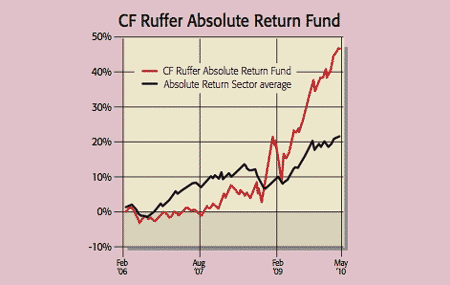Tread warily in absolute-return funds
Absolute-return funds promise the best of both worlds - good returns as the market rises, and no downside when it falls. It sounds too good to be true. And that's why you should be careful.

Get the latest financial news, insights and expert analysis from our award-winning MoneyWeek team, to help you understand what really matters when it comes to your finances.
You are now subscribed
Your newsletter sign-up was successful
Want to add more newsletters?

Twice daily
MoneyWeek
Get the latest financial news, insights and expert analysis from our award-winning MoneyWeek team, to help you understand what really matters when it comes to your finances.

Four times a week
Look After My Bills
Sign up to our free money-saving newsletter, filled with the latest news and expert advice to help you find the best tips and deals for managing your bills. Start saving today!
Absolute-return funds promise the best of both worlds. They claim to offer steady returns above the rate you would earn on cash when the stockmarket rises and limited, or even no, downside when it falls. It sounds like a no-brainer. Which is why investors should tread warily.
To deliver their promised smoothed returns these funds use a wide range of instruments familiar to hedge funds. These may include derivatives such as futures, that enable the fund to short-sell (bet on falling prices). Absolute-return managers are also usually able to invest in a wide range of asset classes and switch regularly between the best performers.
So far so good. As Ben Yearsley at Hargreaves Lansdowne puts it, "if most investors were asked if they would like a fund geared to provide 7%, 8% or 9% growth year in year out, they would be delighted". Particularly given the FTSE 100 has gone nowhere over the last decade. So what's not to like?
MoneyWeek
Subscribe to MoneyWeek today and get your first six magazine issues absolutely FREE

Sign up to Money Morning
Don't miss the latest investment and personal finances news, market analysis, plus money-saving tips with our free twice-daily newsletter
Don't miss the latest investment and personal finances news, market analysis, plus money-saving tips with our free twice-daily newsletter
First, charges. The initial charge can be up to 5.5% with annual fees of 1.5%-1.75%. That's all pretty standard, but you may also pay an outperformance fee should the fund exceed its target return. So you have to choose well to justify "the complexity and expense" of these funds, says the Motley Fool's David Kuo.
Another problem is that while the expression 'absolute return' might suggest you can't lose money, you can. When the stockmarket flopped in 2008, several absolute-return funds lost money too. Yet when the market is rallying, as it has been since March 2009, a cheap exchange-traded fund (ETF) looks a better bet if you believe the gains will continue you get the full upside without the added expense.
Given these caveats, are any of these funds worth buying? Cautious investors might just be better off putting some of their money in cash and the rest in ETFs tracking the asset classes you like, so you capture some potential upside without risking it all if the market crashes.

But if you're tempted by absolute-return funds, one of the best looks to be the CF Ruffer Total Return Fund (0845-601 9610). Managed by David Ballance and Steve Russell, the five year total return is just over 70%, making the fund the Investment Management Association's top sector performer. And it invests heavily in Japan, gold and defensive stocks, all of which we like.
Get the latest financial news, insights and expert analysis from our award-winning MoneyWeek team, to help you understand what really matters when it comes to your finances.

Ruth Jackson-Kirby is a freelance personal finance journalist with 17 years’ experience, writing about everything from savings accounts and credit cards to pensions, property and pet insurance.
-
 Should you buy an active ETF?
Should you buy an active ETF?ETFs are often mischaracterised as passive products, but they can be a convenient way to add active management to your portfolio
-
 Power up your pension before 5 April – easy ways to save before the tax year end
Power up your pension before 5 April – easy ways to save before the tax year endWith the end of the tax year looming, pension savers currently have a window to review and maximise what’s going into their retirement funds – we look at how